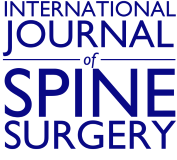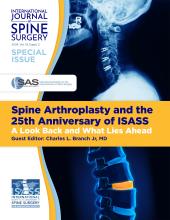ABSTRACT
Background The purpose of the present study is to report the 2-year clinical outcomes for chronic low back pain (CLBP) patients treated with radiofrequency (RF) ablation of the basivertebral nerve (BVN) in a randomized controlled trial that previously reported 1-year follow up.
Methods A total of 147 patients were treated with RF ablation of the BVN in a randomized controlled trial designed to demonstrate safety and efficacy as part of a Food and Drug Administration-Investigational Device Exemption trial. Evaluations, including patient self-assessments, physical and neurological examinations, and safety assessments, were performed at 2 and 6 weeks, and 3, 6, 12, 18, and 24 months postoperatively. Participants randomized to the sham control arm were allowed to cross to RF ablation at 12 months. Due to a high rate of crossover, RF ablation treated participants acted as their own control in a comparison to baseline for the 24-month outcomes.
Results Clinical improvements in the Oswestry Disability Index (ODI), Visual Analog Scale (VAS), and the Medical Outcomes Trust Short-Form Health Survey Physical Component Summary were statistically significant compared to baseline at all follow-up time points through 2 years. The mean percent improvements in ODI and VAS compared to baseline at 2 years were 53.7 and 52.9%, respectively. Responder rates for ODI and VAS were also maintained through 2 years with patients showing clinically meaningful improvements in both: ODI ≥ 10-point improvement in 76.4% of patients and ODI ≥ 20-point improvement in 57.5%; VAS ≥ 1.5 cm improvement in 70.2% of patients.
Conclusions Patients treated with RF ablation of the BVN for CLBP exhibited sustained clinical benefits in ODI and VAS and maintained high responder rates at 2 years following treatment. Basivertebral nerve ablation appears to be a durable, minimally invasive treatment for the relief of CLBP.
Footnotes
Disclosures and COI: Rick Sasso, Scott Kitchel, Hyun Bae, Christopher Yeung, Eeric Truummees, Philip Yuan, Peter Vajkoczy, Michael DePalma, and Lee Thibodeau have no disclosures to report. Jeffrey S. Fischgrund reports consultancy for Relievant. Alfred Rhyne reports consultancy for Relievant. Jörg Franke reports consultancy and an honoraria from Relievant. Michael Schaufele reports consultancy for Relievant. David G. Anderson reports consultancy for DePuy Synthes Spine, K2M Spine, and Integrity Spine. Bernhard Meyer reports honoraria, travel support, consultancies, and funded research by Medtronic, DePuy, Umrich, Icotech, Spineart, and Relievant. Research Oversight and Ethics: This research was conducted under the oversight of the Western Institutional Review Board and the investigational site's local institutional review board. Informed consent was obtained for participants in this study. This research was conducted in accordance with the Helsinki Declaration.
- ©International Society for the Advancement of Spine Surgery







